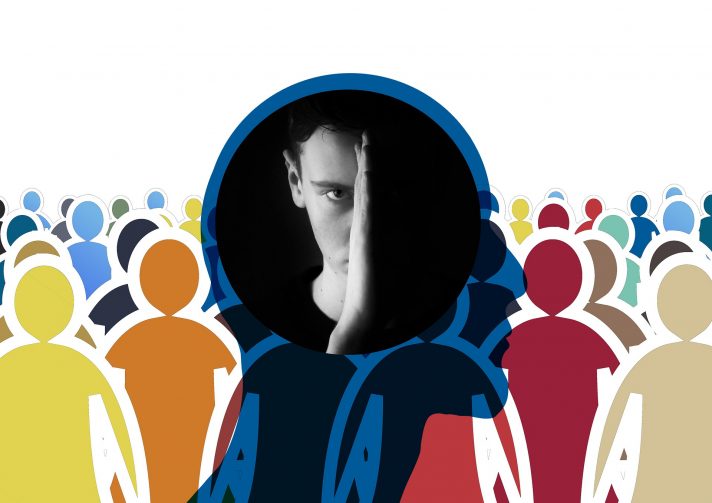By: NHI (National Institute of Mental Health)
Are you very afraid of being judged by others? Are you very self-aware in everyday social situations? Avoid meeting new people? If you have felt this way for at least six months and these feelings make it difficult for you to do everyday tasks, such as talking to others at work or school, you may have a social anxiety disorder.
Social anxiety disorder (also called social phobia) is a mental health problem. It is an intense and persistent fear of being observed and judged by others. This fear can affect work, school, and other daily activities. It can even make it difficult for you to make and keep friends. However, social anxiety disorder does not have to stop you from reaching your potential. Treatment can help you overcome your symptoms.
What is social anxiety disorder?
Social anxiety disorder is a common type of anxiety disorder. People with this disorder have symptoms of anxiety or fear in certain or all social situations, such as when they meet new people, go on dates, have a job interview, answer a question in class, or have to talk to a store cashier. Even doing simple things in front of other people, such as eating or drinking in front of others or using a public toilet, can cause them anxiety or fear. They are afraid of being humiliated, judged and rejected.
The fear that people with this disorder have in social situations is so strong that they think that controlling it is beyond their capacity. As a result, fear gets in the way of your ability to go to work, attend school, or do everyday things. People with social anxiety disorder can worry about these and other things for weeks before they happen. Sometimes, they end up not going to places or events where they think they might have to do something that embarrasses them.
Some people with this disorder do not have anxiety in social contexts, but rather have performance anxiety. That is, they feel physical symptoms of anxiety in situations such as when they have to give a speech, participate in sports, or dance or play a musical instrument on stage.
In people who are extremely shy, social anxiety disorder usually begins in youth. This disorder is not that rare. Research suggests that about 7 percent of people in the United States are affected. Without treatment, the social anxiety disorder can last for many years or a lifetime and can prevent a person from reaching their full potential.
What are the signs and symptoms of social anxiety disorder?
When they are surrounded by other people or when they have to act in front of someone, people with social anxiety tend to:
- Blushing, sweating, shaking, or feeling your heart beating too fast or your “mind going blank”
- Having nausea or upset stomach
- Showing rigid body posture, make little eye contact, or speak in an extremely low voice
- Feeling scared or making it difficult for them to be with other people, especially if they don't know them yet, and having difficulty talking to them even if they wanted to
- Being very self-conscious in front of other people and feel embarrassed and clumsy
- Being very afraid of being judged by others
- Avoiding places where there are other people
What Causes Social Anxiety Disorder?
Sometimes social anxiety disorder is inherited, but no one knows for sure why some family members have it and others don't. Researchers have found that fear and anxiety involve various parts of the brain. Some researchers think that a misinterpretation of the behavior of others can play a role in generating or worsening social anxiety. For example, you may think that they are looking at you or frowning when they really aren't. Not having well-developed social skills is another possible contributor to social anxiety. For example, if you do not have good social skills, you may feel discouraged after talking to other people and may worry about having to do it again. By learning more about fear and anxiety in the brain, scientists may be able to develop better treatments. Researchers are also exploring whether stress and environmental factors can play a role.
How is social anxiety disorder treated?
First, talk to your doctor about your symptoms. It is important that your doctor perform an exam and take your medical history to make sure that your symptoms are not caused by some unrelated physical problem. Your doctor may refer you to a mental health specialist, such as a psychiatrist, psychologist, clinical social worker, or counselor. The first step to effective treatment is to establish a diagnosis, and that will usually be done by a mental health specialist.
Social anxiety disorder is usually treated with psychotherapy (sometimes called “dialogue” therapy), medications, or a combination of the two. Ask your doctor or other health care provider what treatment is best for you. If they cannot refer you to a specialist, visit the NIMH's mental illness help page at www.nimh.nih.gov/findhelp for resources that may be helpful.
Psychotherapy
A class of psychotherapy called cognitive-behavioral therapy is especially useful for treating social anxiety disorder. It teaches other ways of thinking, behaving, and reacting to different situations to feel less anxiety or fear. In addition, it also serves to learn and practice how to perform socially. Cognitive-behavioral therapy may be especially useful in groups. For more information about psychotherapy, visit our psychotherapy page: www.nimh.nih.gov/health/topics/psychotherapies.Una clase de psicoterapia llamada terapia cognitivo-conductual es especialmente útil para tratar el trastorno de ansiedad social. Enseña otras formas de pensar, comportarse y reaccionar ante distintas situaciones para sentir menos ansiedad o temor. Además, también sirve para aprender y practicar a desenvolverse socialmente. Puede ser especialmente útil realizar la terapia cognitivo-conductual en grupo. Para más información sobre la psicoterapia, visite nuestra página en inglés sobre el tema: www.nimh.nih.gov/health/topics/psychotherapies.
Support groups
Many people with social anxiety also find support groups beneficial. In the context of a group in which all people have social anxiety disorder, you can receive unbiased and honest information about how others in the group see it. In this way, you realize that your thoughts about how others judge and reject you are not real or distorted. You can also learn how other people with social anxiety disorder address and overcome fear of social situations.
Medication
There are three types of medications used to treat anxiety disorder:
Anxiolytics (medicines to fight anxiety)
Anti-depressants
Beta-blockers or beta-blockers
Anxiolytics are powerful and start working right away to reduce feelings of anxiety. However, these medications are usually not taken for long periods of time. People can develop tolerance if they take it over a long period of time and may need higher and higher doses to achieve the same effect. Some people may even become dependent on them. To avoid these problems, doctors usually prescribe anxiolytics for short periods, a practice that is especially favorable in the case of older people
Although antidepressants are mainly used to treat depression, they also treat the symptoms of social anxiety disorder. In contrast to anxiolytics, antidepressants may take several weeks to start working. They can also cause side effects, such as headaches, nausea, or difficulty sleeping. These side effects are not usually serious for most people, especially if you start with a low dose and gradually increase it. Talk to your doctor about any side effects you have.
Beta-blockers are medicines that can help block some of the physical symptoms of anxiety, such as a fast heartbeat, excessive sweating, or shaking. Beta-blockers are usually the preferred medications for treating the type of performance-related social anxiety.
Your doctor will work with you to find the medicine, dose, and duration of treatment that are most suitable for you. Many people with social anxiety disorder achieve the best results using a combination of medications and cognitive-behavioral therapy or other type of psychotherapy.
No abandone el tratamiento demasiado rápido. Tanto la psicoterapia como la medicación pueden tomar algún tiempo hasta lograr resultados. Un estilo de vida saludable también puede ayudar a combatir la ansiedad. Asegúrese de dormir lo suficiente y hacer ejercicio, comer una dieta saludable, y recurrir a la familia y los amigos de confianza para apoyo.
Do not give up treatment too quickly. Both psychotherapy and medication may take some time to achieve results. A healthy lifestyle can also help fight anxiety. Be sure to get enough sleep and exercise, eat a healthy diet, and turn to family and trusted friends for support.
For basic information about these and other mental health medications, visit our English page https://www.nimh.nih.gov/health/topics/mental-health-medications. You can also visit the Food and Drug Administration (FDA) website www.fda.gov/AboutFDA/EnEspanol (Spanish) or www.fda.gov (English) for the latest information on warnings, patient drug guidelines, or newly approved drugs.
For more information:
To learn more about social anxiety disorder, visit MedlinePlus (National Library of Medicine) http://medlineplus.gov.
Learn how to participate in clinical trials at www.nimh.nih.gov/health/trials/index.shtml (inglés); https://www.nimh.nih.gov/health/publications/espanol/los-ensayos-de-investigacion-clinica-y-usted-preguntas-y-respuestas/index.shtml (español).
For additional information on issues affecting mental health, or to find out about mental health resources and research, visit the NIMH website at www.nimh.nih.gov (English) or https://www.nimh.nih.gov/health/publications/espanol/index.shtml (Spanish).


